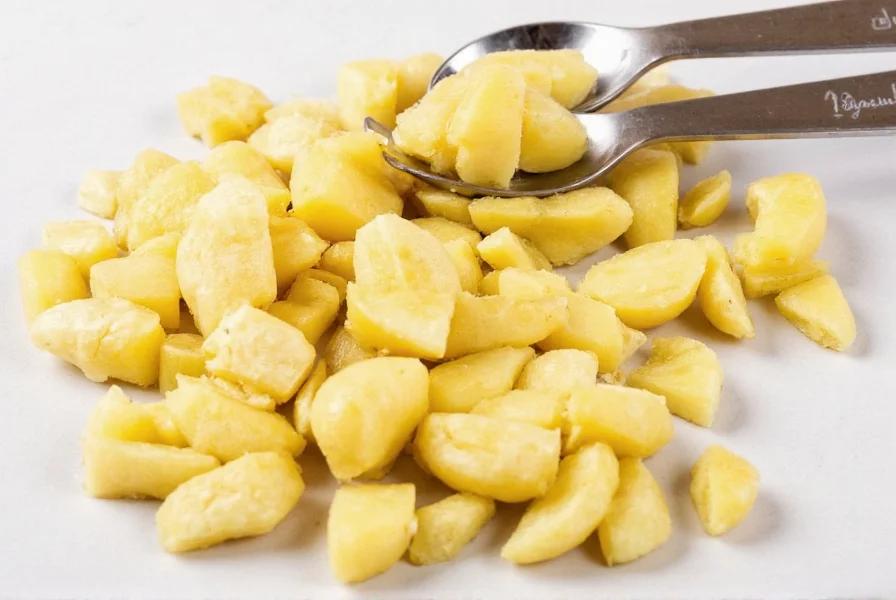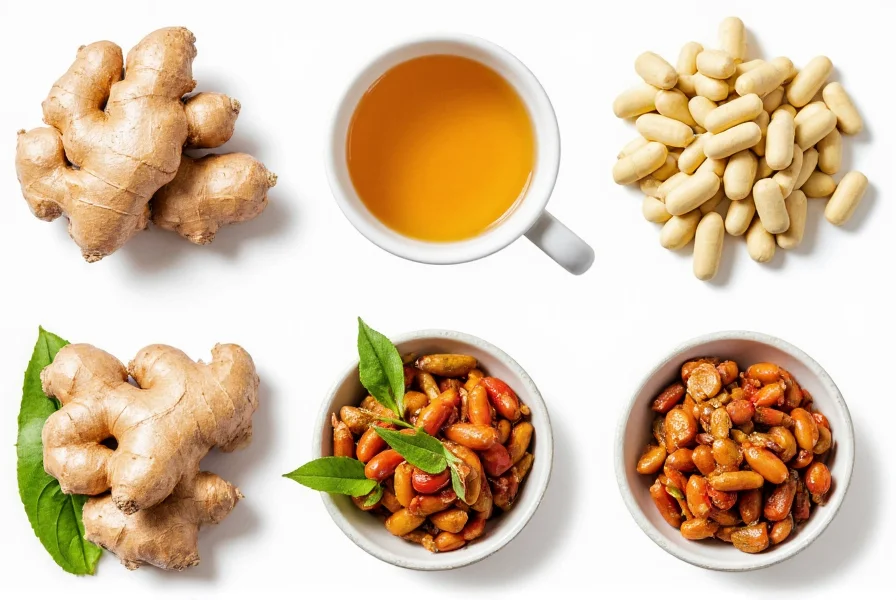Science-Backed Health Applications of Ginger
Ginger (Zingiber officinale) has been used in traditional medicine for centuries, but modern research continues to validate many of its health applications. The root contains potent bioactive compounds, primarily gingerols and shogaols, which give ginger its distinctive flavor and therapeutic properties. Unlike many herbal remedies with limited scientific backing, ginger has substantial research supporting specific health uses.
Nausea and Digestive Relief
One of ginger's most well-documented uses is for nausea relief. Multiple clinical trials confirm ginger's effectiveness for various forms of nausea:
| Nausea Type | Effective Dosage | Research Support |
|---|---|---|
| Morning sickness | 1-1.5g daily | Multiple RCTs showing significant improvement |
| Post-operative nausea | 1g before surgery | Meta-analysis of 12 studies confirms benefit |
| Chemotherapy-induced nausea | 0.5-1g daily | Moderate evidence, works best with standard treatments |
For digestive issues, ginger stimulates saliva, bile, and gastric enzyme production. This natural remedy for nausea with ginger works by accelerating gastric emptying and reducing intestinal contractions. A 2020 review in Nutrients found ginger significantly improved symptoms in functional dyspepsia patients.

Inflammation and Pain Management
Ginger's anti-inflammatory properties make it valuable for managing chronic pain conditions. The gingerols inhibit inflammatory pathways similar to NSAIDs but without the same side effects. Research shows particular promise for:
- Osteoarthritis: A 6-week study found 500mg ginger extract twice daily reduced knee pain by 30%
- Muscle soreness: Consuming 2g ginger daily for 11 days reduced exercise-induced muscle pain by 25%
- Menstrual pain: 75-1500mg daily during the first 3-4 days of menstruation significantly reduced pain
Unlike pharmaceutical options, how to use ginger for inflammation requires consistent consumption over weeks to achieve maximum benefit. The anti-inflammatory effects build gradually as ginger compounds accumulate in the system.
Immune System Support
Ginger's immune-boosting properties come from its antioxidant and antimicrobial effects. The root contains 16 distinct antioxidants that combat oxidative stress. During cold and flu season, ginger tea benefits for immune system become particularly relevant:
- Gingerols demonstrate antiviral activity against respiratory viruses
- Warms the body and promotes sweating during fevers
- Reduces throat inflammation and coughing
A 2021 study in the Journal of Medicinal Food found that ginger extract inhibited the replication of certain respiratory viruses in laboratory settings. While not a cure, regular ginger consumption appears to strengthen the body's first-line defenses.
Blood Sugar and Cardiovascular Benefits
Emerging research suggests ginger may help regulate blood sugar and improve cardiovascular markers. In a 12-week trial with type 2 diabetes patients, 2g of ginger powder daily reduced fasting blood sugar by 12% and improved HbA1c levels.
Ginger also shows promise for heart health by:
- Reducing LDL cholesterol levels
- Lowering blood pressure through vasodilation
- Preventing blood clot formation
These scientific evidence of ginger health benefits for metabolic health appear most pronounced with consistent, long-term use rather than occasional consumption.
Practical Ways to Incorporate Ginger
Understanding best ways to incorporate ginger into diet ensures you receive maximum benefits:
- Fresh ginger: Grate 1-2 teaspoons into smoothies, stir-fries, or salad dressings
- Ginger tea: Steep 1-inch sliced ginger in hot water for 10 minutes (add lemon and honey)
- Capsules: Standardized extracts provide consistent dosing (follow label instructions)
- Cooking: Add to soups, curries, and marinades for both flavor and benefits
For ginger benefits for digestion, consume ginger 20-30 minutes before meals. The pungent compounds stimulate digestive enzyme production, preparing your system for food intake.

Dosage Guidelines and Safety
While ginger is generally safe, proper dosing matters for therapeutic effects:
- Nausea relief: 1-1.5g daily (divided doses)
- Inflammation: 2g daily for 4-12 weeks
- General wellness: 0.5-1g daily
Most daily ginger consumption side effects are mild, including heartburn or mouth irritation. Avoid ginger if:
- Taking blood thinners (may increase bleeding risk)
- Have gallstone issues (may increase bile production)
- Are in late pregnancy (consult your healthcare provider)
Pregnant women should limit intake to 1g daily for nausea relief. While ginger is generally recognized as safe, always discuss medicinal use with your healthcare provider, especially if managing chronic conditions.
Limitations of Current Research
Despite promising findings, ginger research has limitations:
- Many studies use small sample sizes
- Optimal dosing isn't standardized across conditions
- Long-term effects beyond 12 weeks aren't well studied
- Individual responses vary significantly
Ginger shouldn't replace conventional medical treatments but can serve as a complementary approach. The quality of ginger products varies widely, so choose reputable sources for supplements.
Conclusion
Ginger offers multiple evidence-based health benefits, particularly for nausea, inflammation, and digestion. The key to experiencing ginger benefits for digestion and other applications lies in consistent, appropriate dosing. While not a miracle cure, incorporating ginger into your wellness routine provides a natural approach to supporting several bodily systems. Always prioritize quality sources and consult healthcare professionals when using ginger for specific medical conditions.
Frequently Asked Questions
What's the most effective way to use ginger for morning sickness?
For morning sickness, research shows 1-1.5 grams of ginger daily provides significant relief. This can be taken as 2-4 capsules of 250mg ginger extract, 1-2 teaspoons of fresh grated ginger in tea, or crystallized ginger. Start with smaller doses and increase gradually. Effects typically begin within 30-60 minutes and last several hours.
How much ginger should I take daily for inflammation?
For inflammation management, studies show 2 grams of ginger daily provides measurable benefits. This typically requires consistent consumption for 4-12 weeks to see significant results. Divide the dose throughout the day (e.g., 1g twice daily) for better absorption. Fresh ginger, extracts, and powders all work, but standardized extracts provide more consistent dosing.
Can ginger interact with medications?
Yes, ginger can interact with certain medications, particularly blood thinners like warfarin, as it may increase bleeding risk. It might also enhance the effects of diabetes medications, potentially causing low blood sugar. If you take medications for heart conditions, diabetes, or blood pressure, consult your healthcare provider before using ginger medicinally. Most dietary amounts (under 1g daily) pose minimal risk for healthy individuals.
Is fresh ginger more effective than powdered ginger for health benefits?
Fresh and powdered ginger both offer health benefits, but they contain different active compounds. Fresh ginger has higher gingerol content, while dried/ powdered ginger contains more shogaols, which are more potent anti-inflammatories. For nausea relief, fresh ginger may work better initially. For chronic inflammation, powdered ginger might provide stronger effects. For most health applications, either form works well when used consistently at appropriate doses.
How long does it take to feel ginger's health benefits?
The timeframe varies by application. For nausea relief, effects typically begin within 30-60 minutes. Digestive benefits may be noticed within hours of consumption. Anti-inflammatory effects require consistent daily use for 2-4 weeks before significant improvements occur. Blood sugar and cholesterol benefits usually take 8-12 weeks of regular consumption. Individual responses vary based on metabolism, health status, and dosage.










 浙公网安备
33010002000092号
浙公网安备
33010002000092号 浙B2-20120091-4
浙B2-20120091-4